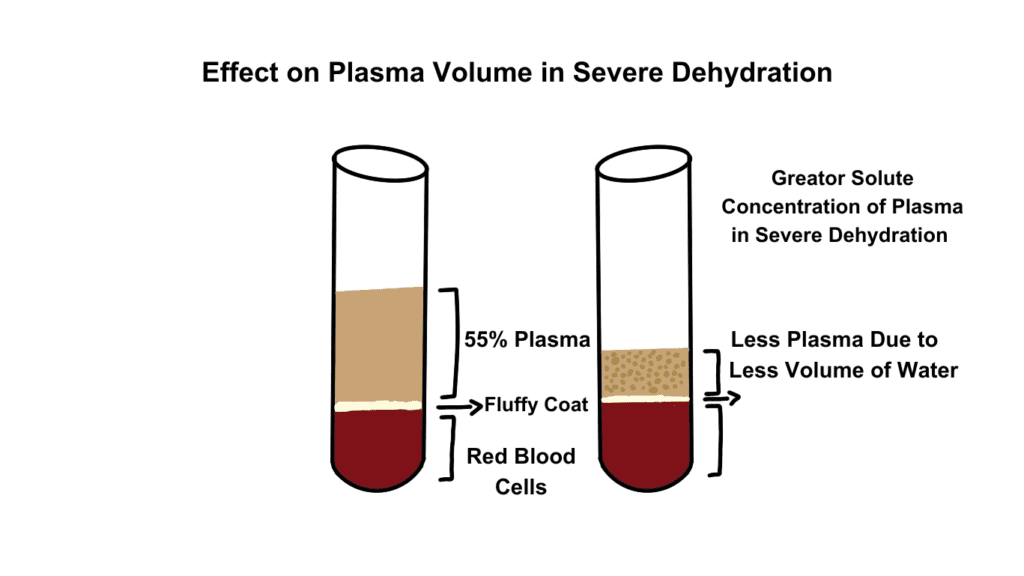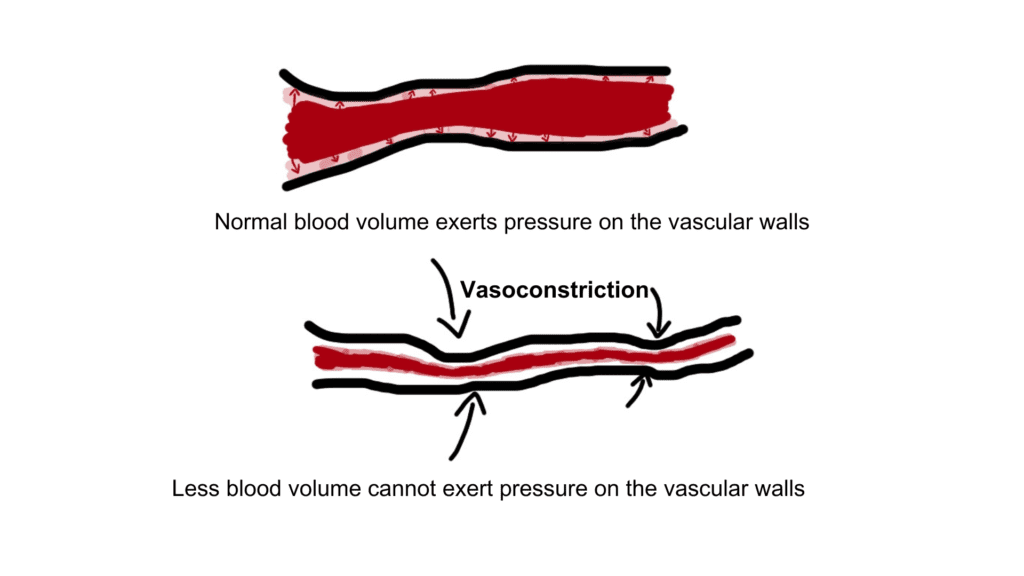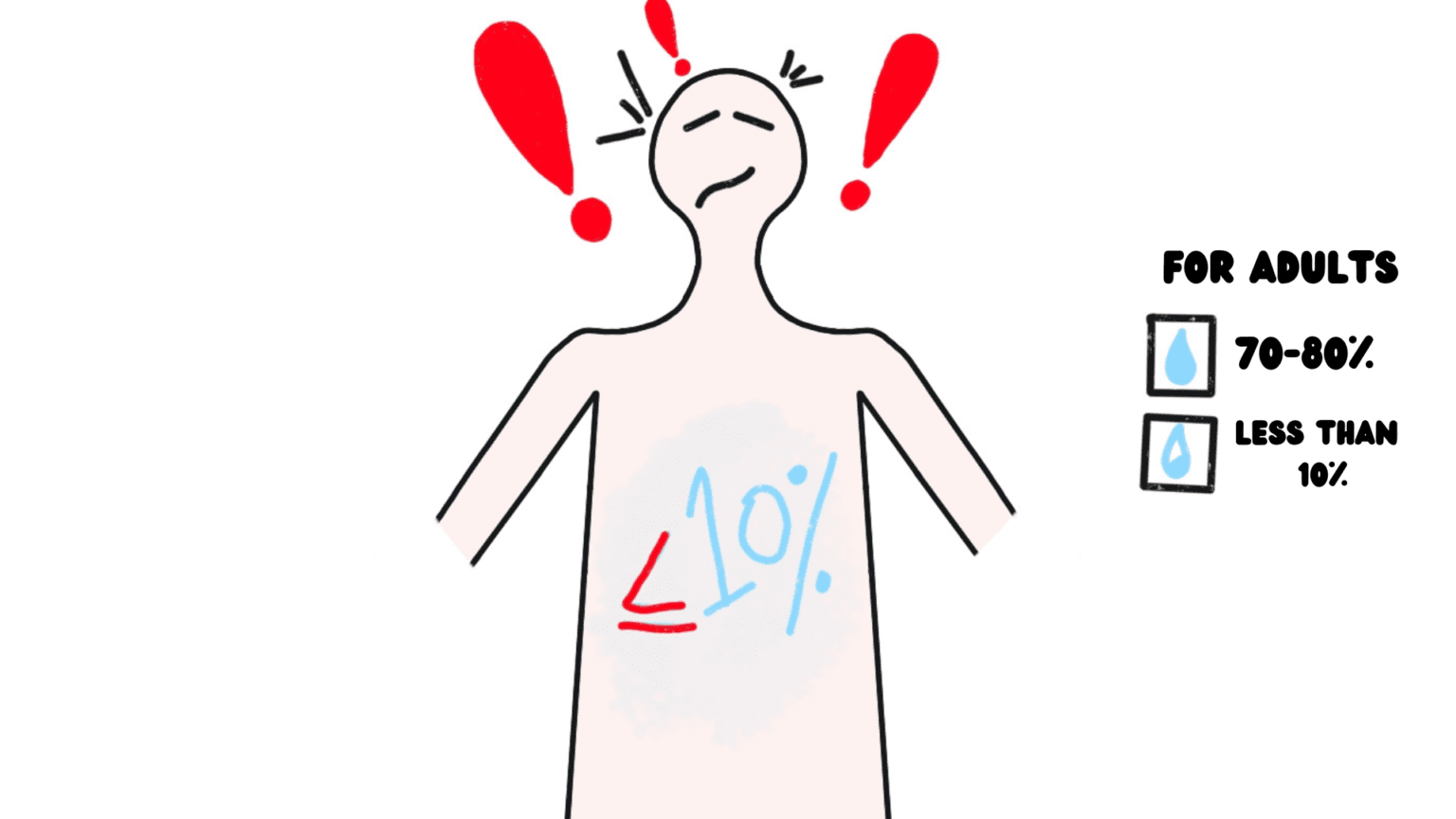Severe dehydration has the potential to cause hypovolemic shock. Dehydration is the loss of water or other body fluids due to several reasons. The human body roughly consists of 75-80% water. All enzymes need aqueous media to catalyze the biochemical reactions. Our body directly or indirectly depends upon the water content. Water contains salts, electrolytes, minerals, and other metabolites. The presence of all these elements is obligatory for optimal body functioning.
Why Hydration is Crucial to the Human Body?
As explained above, fluids make more than 70% of our body. All biochemical reactions taking place in our body require the facilitating activity of enzymes. Enzymes are globular proteins and always demand a fluid-like medium for their action. In hot environments or strenuous exercises, the body generates heat. Water is the central player in removing excess heat from the body to maintain the optimal temperature. Sweating or perspiration needs water to remove this unwanted heat. Water, as a component of blood, makes a significant portion and maintains the blood volume. Severe dehydration causes the blood volume to drop and inducing hypovolemic shock.
Consequences of Low Blood Volume Due to Severe Dehydration
Reduced blood volume drops the blood pressure notably and exacerbates the situation. Blood is the primary nutrient and oxygen transporter. Low blood volume cannot meet the requirements of all body cells and let them survive hypoxic conditions. Within the framework of bones, water is the component of synovial fluid. Synovial fluid refines mobility in joints and mitigates the rubbing of bones. Kidneys remove toxins and wastes from the blood. They require water to help them do their job. Water, voluntarily, asks the kidneys to let it absorb wastes and remove them from the body in the form of urine. Urination is the savior mechanism for its property of expelling unwanted nitrogenous and other substances from the body.
The most important of all is the electrolyte-balancing Balancing Property of Water. Water is the control to balance electrolyte distribution. Water levels correspond to the electrolyte levels and maintain the necessary processes i.e., passive diffusion and osmosis in check. Calcium, potassium, and sodium are the most integral electrolytes of the body. Calcium is significant in muscle contractions, whereas thrice of them are the chief players in nerve impulse transmission. Hydration also contributes to polishing the cognitive abilities of a person. Severe dehydration triggers confusion, disorientation, memory impairment, or other intellectual abnormalities.
Understanding Hypovolemic Shock
Low body fluids make the blood volume also drop. Blood comprises 55% of plasma and 45% of cell bodies. 90% of plasma contains water and the remaining 10% consists of dissolved substances. When the water content of the body is low, it leads to low blood volume (hypovolemia). Reduced blood volume is unable to supply oxygen and nutrients to all body cells. Hypovolemia substantially reduces the blood pressure. To compensate for low blood pressure, the heart starts to beat promptly. Rapid heart rate and a weak pulse are the key symptoms of hypovolemia.

Compensatory mechanisms are not even sufficient to maintain blood pressure and deliver oxygen appropriately. Consequently, the vital organs including the brain, kidneys, and the liver cannot withstand such severe hypoxic conditions, leading to organ dysfunction. Multiple organ failure can arise in the scenario of prolonged and severe dehydration. Immediate medical intervention is required to assist the patient. Fluid replacement is the most timely action to save the life of the patient.
Underlying Factor That Incite Severe Dehydration
Less fluid intake or excess fluid loss both are the chief contributors to severe dehydration. Not properly hydrating the body in hot climates or robust physical activities is the reason behind severe dehydration. Babies and the elders are more liable to severe dehydration as their bodies have immature or weak kidney functions, provoking excess fluid loss. These individuals also have poor fluid reserves in their bodies. Babies have poor mechanisms to counter vomiting and diarrhea which leads to excess fluid loss. Certain medications have a diuretic effect, inducing frequent urination. Diuresis (increased urge to urinate) is the leading cause of severe dehydration if not properly compensated by adequate fluid consumption.
Diabetic patients are more at the edge of excess urination, consequently leading to severe dehydration. Some diabetic medicines have diuretic effects, contributing to excessive fluid loss. Alcohol and caffeine consumption has a diuretic effect, as well as the body needs more fluid to compensate for the loss. Age is the major factor in the sphere of severe dehydration. With the increasing age, kidneys become insufficient to carry out optimal excretion of fluid. Renal impairment contributes to the over-excretion of water due to the compromised integrity of fluid reserves in the body.
How Severe Dehydration Leads to Hypovolemic Shock? The Mechanism Explained
Low Blood Volume
Blood is almost water with blood cells. Blood cells need a fluid media for their propagation within blood vessels. Water, as a universal solvent, serves this purpose efficiently. Water can carry nutrients, oxygen, wastes, and other useful substances without chemically altering them. That’s why blood contains water. Low water levels in the case of severe dehydration can pose a threat to the transport of oxygen and other nutrients to the required sites. Blood volume is intensely affected by severe dehydration.
Increased Heart Rate
The heart got the job of pumping blood to all body parts, including the heart itself. Low blood volume makes the heart pump more laboriously to deliver the available blood volume to all body cells. The heart starts to beat more rapidly and intensely for the effective delivery of reduced blood volume. Rapid heartbeats even fail to enhance the reduced cardiac output.
Blood Pressure Maintenance
Reduced cardiac output (the amount of blood the heart pumps through the left ventricle into the systemic circulation every minute) and low blood volume cause a substantial drop in blood pressure. Compensatory mechanisms like vasoconstriction take part in play to somehow manage the situation. Although it has some effect on the maintenance of blood pressure if severe dehydration persists, vasoconstriction cannot even assist the situation.

Hypoperfusion and Organ Dysfunction
The prime consequence of severe dehydration is the compromised delivery of oxygen and nutrients to the body’s cells and organs. Tissue perfusion is the supply of essential nutrients and oxygen to the tissues. Hypovolemia leads to hypoperfusion of tissues. If tissue hypoperfusion is pursued for a prolonged period, it leads to organ dysfunction and ultimately, organ failure. The organs which are more sensitive to oxygen availability rapidly suffer from destructive features. The brain is at the top of these vital organs. The brain needs adequate oxygen supply to meet its demands. Foremostly, hypoxia causes neural impairment.
Hypovolemic shock, if not addressed promptly, can be fatal and cause the death of the person due to multiple organ failure. Immediate fluid replacement or hydration is the urgent methodology to adjust the ongoing complications.
In a Nutshell
Hydrating the body is mandatory to regulate several mechanisms in the body. Hypovolemic shock is just one of the consequences of severe dehydration. Many other fatal consequences can arise from this condition. So, proper hydration and urination is the key. If severe dehydration is fatal then severe hydration can also be fatal. We will cover this area of concern in some other blog.




